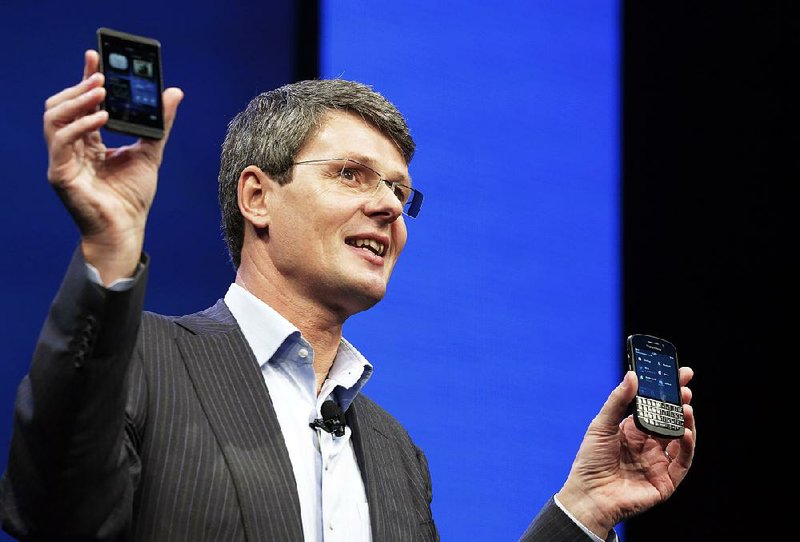LITTLE ROCK — BlackBerry’s latest phone faces a lengthy testing process by carriers in the United States, its biggest single market, further delaying the arrival of a product that is already more than a year late.
Verizon Wireless and AT&T Inc., the two largest U.S. wireless-service providers, have multi-step tests that can take months to complete. The devices are checked for signal strength, battery life, call quality, heat tolerance and data performance, according to the carriers. BlackBerry, formerly known as Research In Motion, has said that all the carriers got the new phone at the same time, putting its wireless partners on equal footing when the testing began.
The slow process means the new Z10, unveiled at a New York event last week, will go on sale in the United States in March - more than a month after its debut in the United Kingdom. The lag has frustrated efforts to roll out the phone globally, contributing to a 17 percent decline in Black-Berry’s shares. It also means the company is getting less value from its first-ever Super Bowl ad Sunday, when no one in the United States can buy the phone.
“It’s really hard to have a global, simultaneous launch of anything,” said Tavis McCourt, an analyst with Raymond James & Associates in Nashville, Tenn. “And you only get one chance a year for a Super Bowl ad.”
When BlackBerry unveiled the new smart phone Wednesday, it gave a range of release dates for the product’s initial markets. British carriers such as Vodafone Group Plc began offering the Z10 Wednesday, while Canadians will get the phone on Tuesday. It arrives in the United Arab Emirates on Feb. 10.
BlackBerry, based in Waterloo, Ontario, didn’t offer a firm release date for the United States, saying it would be sometime in March. After the slow roll out irked investors, Chief Executive Officer Thorsten Heins pointed the finger at U.S. carriers.
Mark Siegel, a spokes-man for Dallas-based AT&T, declined to comment on the BlackBerry delay.
Torod Neptune, a spokesman for Basking Ridge, N.J.-based Verizon Wireless, said the testing process can be more lengthy for devices running on new operating systems, as is the case with the Z10 and Q10, another BlackBerry smart phone.
“There’s really no typical length of time for a phone to go through testing,” he said. “We have a rigorous and extensive testing protocol, and how long that process takes depends on the device and the issues we may encounter.”
All the carriers got the final software for the phones, known as the “gold code,” at the same time, Heins said. U.S. service providers received the phones themselves at the same time as other carriers around the world, BlackBerry confirmed Wednesday.
“Verizon, AT&T, Sprint, T-Mobile - they have to comply with certain rules they are subject to,” Heins said. “They’re trying to speed it up.”
The situation reflects a balance of power in the United States where carriers rather than phone manufacturers dictate the terms, said Michael Cote, a wireless strategist at the Cote Collaborative in Chicago.
“It’s different for phone makers here,” said Cote, a former sales executive at T-Mobile USA, the fourth-largest U.S. carrier. “U.S. carriers are accustomed to running roughshod over phone manufacturers.”
An exception to that rule may be Apple Inc., which demanded a revenue-sharing agreement from AT&T when the companies first introduced the iPhone in 2007. When Sprint Nextel Corp., the No. 3 carrier,got the rights to the iPhone in 2011, Apple required it to buy at least $15.5 billion worth of the phones - a requirement that weighed on Sprint’s shares.
Verizon Wireless said that the Z10 will be available for $200 with a two-year service agreement, in line with what other major smart phones cost. In Canada, it will cost about $150 with a three-year contract.
Even knowing that U.S. carriers take longer to approve phones, BlackBerry failed to get the new model to American carriers sooner than its overseas partners. The company has been racing to finish developing the phone after multiple delays that put the Z10’s debut at least a year behind schedule.
BlackBerry is counting on the new products to reverse six quarters of sales declines and win back market share from Apple and Google Inc.’s Android. Despite positive reviews for the Z10, BlackBerry shares tumbled for a second day Thursday and remained flat Friday amid concerns that U.S. sales will suffer from the delay.
The BlackBerry Q10, a second model equipped with a keyboard, is set to go on sale in April. No specific date was given for any carrier debut of that device.
BGC Financial analyst Colin Gillis said the new phones’ tardy arrival in the United States threatens to cause even more BlackBerry users to defect.
By the time the Z10 goes on sale in the United States, Gillis suspects many people will be waiting to see what Google plans to unveil in mid-May at an annual conference that usually includes new gadgets and an Android software update. Speculation of a new iPhone also may be building by then.
Business, Pages 21 on 02/04/2013
